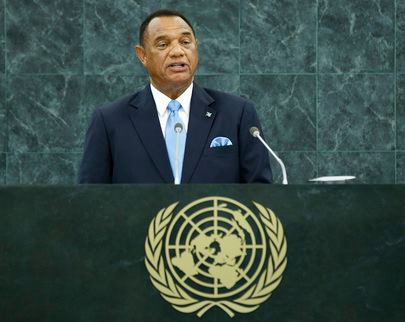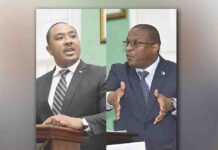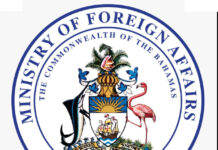
Wutless Media Dem flew to Miami to speak with the Human Traffickers of Cubans to the US – But could not place a call to the PM while he represented the Bahamas at the United National! WHAT IN THE HELL IS DIS?
By OSWALD T. BROWN
NEW YORK — Prime Minister Perry Christie on Saturday used the impressive setting of the United Nations headquarters here in New York to highlight several matters of pressing concern to The Bahamas and the Caribbean region in general.
Addressing the 68th Session of the UN General Assembly, Mr. Christie first congratulated His Excellency Ambassador John W. Ashe of Antigua and Barbuda for having been elected President of the 68th Session.
“As a member of the Caribbean community, The Bahamas takes special pride in the election of one of our region’s own — the third such person to be so elected over the years,” Mr. Christie said. ”Be assured, Mr. President, of our full support as you attend to the duties of the high office to which you have been elected and for which you are, if I may say so, superbly qualified.”
Mr. Christie recalled that in addressing the General Assembly for the first time on October 1, 1973, the late Sir Lynden Pindling, the then Prime Minister, spoke “of our journey from the dehumanizing experiences of slavery and colonialism to the liberating achievements of freedom, majority rule and Independence.”
He noted that Sir Lynden also spoke of the “perpetual interdependence of the Big and the Small,” and the fervent wish of the Bahamian people to be neither dominated nor coerced.
“Sir Lynden’s call for us to be faithful to the responsibilities of our nationhood and world-citizenship is as relevant and compelling today as it was when we were welcomed into the family of the United Nations 40 years ago,” the Prime Minister said. “As the present Prime Minister of The Bahamas, I have therefore come here today, on behalf of the people of the Commonwealth of The Bahamas, to renew our pledge to play our part to help make our planet the place of peace and stability and of collaborative endeavour and mutual support that it was intended to be, and must be, for the good of all humankind. But we need to ensure that such pledges are not just so many catchy phrases. We need to not only talk the talk but walk the walk. We in The Bahamas are determined to do just that.”
Citing one very recent example of this commitment, Mr. Christie said that is why “my Minister of Social Development, Melanie Griffin, on Tuesday of this week here in New York, signed the United Nations Convention on the Rights of the Disabled on behalf of The Bahamas.”
“This is an important step forward that we have taken, marrying our rhetoric to our actions and syncing our domestic agenda to our international obligations,” the Prime Minister said. “We intend to ratify this Convention in the shortest possible time. And we will introduce in our Parliament later this year the necessary legislation to protect the rights of the disabled and to give full effect to our obligations under the Convention. The end to discrimination against the disabled in our country is now clearly in sight. Indeed, it is now imminent.”
Mr. Christie said all member-states of the United Nations are “under a moral obligation to ensure that the policies and aspirational goals which this august body sets for itself” are reflected “in the way that we govern our respective nations internally and, to no less a degree, in the way that we interact with each other as member-states in the international community.”
“For example, we cannot, on the one hand, proclaim that we believe in free trade and then implement policies that inevitably bring about the destruction of agriculture as we know it in the Caribbean; and then, in response to the resulting moral outcry, simply shrug our shoulders and piously lament that ‘the old order changeth,” Mr. Christie said. “We have to become more conscious of the practical outcomes of what we do. Too many times, in the headlong rush for change, we damage the vulnerable and the weak. We then make pledges to help but seldom live up to those pledges in any sustained way. We simply cannot build a credible new world order on the basis of such practices. They run completely counter to our lofty pronouncements about the need for interconnectedness and mutual support in the pursuit of economic progress for all the nations of the world, be they large or small, and be they developed or developing.”
Addressing an issue of particular concern to The Bahamas, the Prime Minister said this same dynamic is “at work in the ongoing economic aggression of many of the more developed countries against small offshore financial service-based economies, especially in the Caribbean region of which The Bahamas is a part.”
“Some have used their power either unilaterally or in small groups of high-powered nations to impose their will, arguing that there is something fundamentally immoral, something intrinsically sinister, about the accumulation of wealth in offshore jurisdictions,” Mr. Christie said. “We reject that premise and we criticize in the strongest possible terms the efforts of some to maim and cripple, if not destroy, the offshore economies within our region. Ironically, the anti-money-laundering, anti-terrorism funding, and anti-criminal regulatory regimes of many of our counties are far more robust and demonstrably far more effective than the corresponding regulatory regimes in many of the same countries that are leading the fight against us.”
Noting that he firmly believes that offshore financial services can be responsibly operated and regulated, the Prime Minister added, “We believe that the sector represents true tax competition and, in the great majority of cases, it affords an honest opportunity for families and individuals alike to protect their privacy while accumulating lawfully earned capital for themselves and future generations.”
Additionally, he said, the evidence is “overwhelming that most of the investment of this offshore wealth takes place in, and generally benefits, the developed world.”
“Unilateralism and diplomacy-by-coercion are not the way the world should be dealing with this issue,” Mr. Christie suggested. ”Instead, we need to challenge the U.N to take the lead in developing and refining multilateral global mechanisms for the governance of the offshore financial services sector; mechanisms that will meet the legitimate demands of the developed world for the protection of their fiscal systems and their need for greater security while at the same time allowing offshore financial service economies to continue to grow in an orderly and properly regulated way.”
He urged fellow world leaders not to “forget that the destruction of these offshore financial service economies will destabilize the countries that depend upon them for their livelihood.”
“To destroy this sector in the Caribbean would effectively cause tens of thousands of newly empowered middle class citizens to slip back into poverty or to migrate to the developed world,” said the Prime Minister, who is also The Bahamas’ Minister for Finance. “The middle class of which I speak constitutes the anchor of social stability for the countries in our region. Take that away and social destabilization emerges as a risk of the most ominous kind. And should that risk materialize, the developed world may well end up finding that it has only solved one problem by creating an infinitely bigger one for itself.”
The Prime Minister also stressed that the need “for greater multilateralism is also evident in many of the other problems confronting The Bahamas and our region.”
“A matter of the highest national priority for us revolves around our ongoing problem with illegal migration to our shores,” Mr. Christie said. “We in The Bahamas suffer from the illegal migration of tens of thousands of desperate people from our sister CARICOM state of Haiti, an exodus driven by crushing poverty. We also have a problem with illegal migration from other countries in the Caribbean albeit to a much lesser extent. Of special note in this regard are migrants from Cuba. We believe that the policies, rooted in the Cold War, that largely account for this migration ought to be brought into alignment with the realities of the modern era.”
Pointing out that although comparatively small in population, The Bahamas is an archipelagic nation that covers a vast area, Mr. Christie added, “With our hundreds of islands, the opportunities for illegal migration are greatly multiplied. At a time when it is imperative that we invest in the education and health and future of my people, we are forced instead to devote an ever-growing share of our resources to the problems associated with illegal migration.”
The Prime Minister said The Bahamas, like the rest of the world, understandably places a great deal of emphasis on the human rights of migrants, but also believes that “there must be similar concerns for the ill-effects on migrant-receiving states such as ours.”
“In particular, we are concerned about the increasingly unsustainable costs that are being incurred and the resulting erosion in the quality of life for the citizenry of The Bahamas,” Mr. Christie said. “Our country simply does not have the financial resources and infrastructural capacity, much less the psychological stamina, to endure this dilemma indefinitely.”
The Prime Minister said another problem that is of “special concern to us is the continuing influx of guns and the increase in gun-related criminality, not only in The Bahamas but throughout the region.”
“As a world community there is, I am convinced, a great deal more that we can and should be doing to fight this common menace,” Mr. Christie added. “The Bahamas has this year signed the Arms Trade Treaty and we encourage all states that have not already done so to sign this Treaty as well. And to those countries that produce the guns that end up taking innocent lives and causing terror in our communities, we implore them to become more proactive in controlling the export of guns. We implore them to step up the policing of their own borders against arms traffickers. We, in The Bahamas, stand ready to play our part in these joint efforts, without which the war on arms-trafficking, human smuggling and the transshipment of illicit drugs will never produce the victory we all strive for. “







